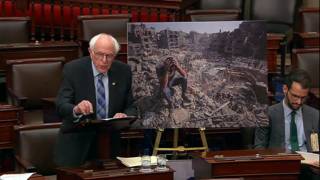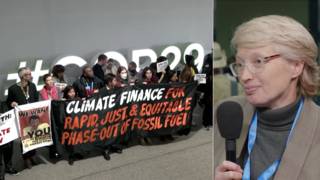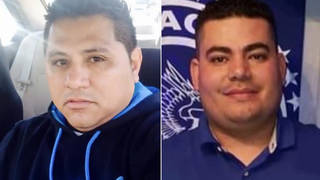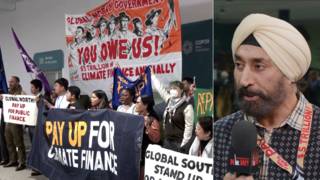
Related
President Obama announced this week that he is delaying a review of his administration’s controversial deportation practices until after the summer, after earlier ordering Homeland Security Secretary Jeh Johnson to look into ways he could take executive action to scale back deportations after civil rights groups dubbed him the “deporter-in-chief.” But during a hearing on immigration policy Thursday, the House Judiciary Committee chair, Republican Rep. Bob Goodlatte of Virginia, made it clear that they remain highly skeptical of negotiating with the president. Immigration rights groups continue to express frustration over the lack of political traction on comprehensive immigration reform. “Our community is angry, and we are going to channel that anger in the most constructive way possible,” says our guest Pablo Alvarado, director of the National Day Laborer Organizing Network, which has engaged in civil disobedience to pressure Obama to immediately stop deportations.
Image Credit: Juliosalgado.com
Transcript
JUAN GONZÁLEZ: This week, President Obama announced he is delaying a review of his administration’s controversial deportation practices until after the summer. Obama had ordered Homeland Security Secretary Jeh Johnson to look into ways he could take executive action to scale back deportations after civil rights groups dubbed him the “deporter-in-chief.” As Congress remains stalled on passing reforms, advocates have called on the president to limit the removal of undocumented immigrants who do not have criminal records, who account for some two-thirds of the two million people he has deported.
AMY GOODMAN: The White House now says it wants to put off any potential reforms in order to avoid angering House Republicans and dooming chances of passage of the comprehensive immigration reform bill this year. But during a hearing on immigration policy Thursday, House Judiciary Committee Chair Bob Goodlatte, Republican of Virginia, made it clear that they remain highly skeptical of negotiating with the president.
REP. BOB GOODLATTE: The Obama administration has taken unprecedented, and most likely unconstitutional, steps in order to shut down the enforcement of our immigration laws for millions of unlawful and criminal aliens not considered high-enough, quote, “priorities,” end-quote. Unfortunately, we can only expect DHS’s efforts to evade its immigration law enforecement responsibilities to escalate. President Obama has asked Secretary Johnson to perform an inventory of the department’s current enforcement practices to see how it can conduct them more humanely. These are simply codewords for further ratcheting down enforcement of our immigration laws.
JUAN GONZÁLEZ: Goodlatte’s remarks came as Homeland Security Secretary Jeh Johnson testified before the committee, just two days after the White House said it would delay its review of deportation policy. Johnson said he remained committed to the effort, when questioned by Representative John Conyers, Democrat of Michigan.
REP. JOHN CONYERS: As you complete your review of enforcement practices, will you take a close, hard look at who’s being targeted to make sure these people who have only immigration status violations are not made priorities?
JEH JOHNSON: Yes. The concept of prosecutorial discretion is one that’s been around for a long time in the criminal justice context, in this context. And I think, with the resources we have from Congress, we have to continually re-evaluate how best to prioritize who we enforce the laws against. And so that would be part of my objective.
JUAN GONZÁLEZ: All of this comes as overwhelmed border authorities in South Texas set up an emergency shelter at Lackland Air Force Base in San Antonio to house about a thousand children who were detained while migrating alone. Johnson said the crisis had, quote, “zoomed to the top of my agenda” after he visited a Border Patrol station where young children were being held, one of whom was just three years old.
AMY GOODMAN: Well, for more, we’re joined in our New York studio by Pablo Alvarado, director of the National Day Laborers Organizing Network, which has called on Obama to take executive action to immediately stop deportations. He was just on Capitol Hill Thursday in meetings with lawmakers.
Welcome back to Democracy Now!
PABLO ALVARADO: Thank you for having me.
AMY GOODMAN: So, about this news that the Obama administration, for fear of antagonizing Republicans, will not change their policy for now, though they’re reviewing it, what’s your response?
PABLO ALVARADO: Well, our community is very angry. We believe that it doesn’t make sense to continue deporting our community for the next three months because of the belief that by doing that we will get immigration reform done. That’s the logic of the last five, 14 years, and it hasn’t worked out at all. So, a new approach needs to be tried here. So, our community is angry, and we’re going to channel that anger in the most constructive way possible.
JUAN GONZÁLEZ: Well, when you say the most constructive way possible, the problem is, we’re now into, what’s it been, eight years since the 2006 immigration protest, when this issue first really hit the national—the national consciousness, and there seems to be very little progress. And so, the president is arguing, “Let’s not alienate Republicans any further. Let’s wait a little longer.” But it doesn’t seem that much gets accomplished by this slow pace of pressure, that it almost seems to me you need some kind of crisis created in the country before both sides will actually deal with immigration reform.
PABLO ALVARADO: I was in Washington, D.C., for the last three days speaking with some of the legislators and some of the immigrant rights groups that are heavily involved in the fight for immigration reform, and none of those folks could actually tell me that the window of opportunity that exists, that supposedly exists this summer, is real or fictitious. None of them could tell us that something is actually going to happen. But what we know for sure is, in the middle of all this uncertainty, that the president can actually act now. So, obviously, immigrant rights activists and people who are being harmed by the system are going to escalate their direct action in the coming months.
AMY GOODMAN: On Thursday, The New York Times ran an editorial headlined “Adding Delay to Immigration Failure,” saying, quote, “There is something ridiculous about the president’s fear of halting a legislative process that has been motionless for nearly a year. And it’s infuriating for him to insist that doing more through executive action to protect families and reset the system’s warped priorities—as he did in halting the deportations of thousands of young people brought to the country as children—is impossible or too politically dangerous.”
The New York Times’ take is quite different from the SEIU’s position. Earlier this week, the union supported Obama’s delay in order to, quote, “give the House leadership all of the space they may need to bring legislation to the floor for a vote.” They added, if the House failed to vote, the, quote, “administration will have an obligation to use whatever tools are at its disposal under the law to prevent the tragic family break-ups and economic disruption that has become daily norm.” The SEIU went on to say, “We sincerely hope it will not come to that, because any such administrative reforms must necessarily be partial and temporary compared with what legislation can accomplish.” Respond to that.
PABLO ALVARADO: Well, I don’t know who persuaded these organizations to take this stand. We obviously disagree. We believe that it’s politically wrong, and in terms of the law as well, we believe that the president can act now. And—
AMY GOODMAN: When the president acted on DACA, you know, the DREAMers, the young people—
PABLO ALVARADO: There is the example.
AMY GOODMAN: —being able to stay, was there enormous Republican backlash?
PABLO ALVARADO: Not at all. On the contrary, when he acted, it benefited him politically, and he helped a lot of people. So, we’re essentially asking him to use the same authority to expand DACA to the extent possible. We’re asking to—asking him to eliminate the Secure Communities program that has caused so much suffering in our community. We’re less safe in our neighborhoods because of this program. So, these are things that the president can do and must do now. Why do we need to wait for three months? That’s thousands of people that are going to be taken away from their loved ones and deported. It doesn’t make sense anymore.
JUAN GONZÁLEZ: Well, isn’t what’s happening now that—again, it’s a replay of the divisions that occurred within the immigration reform movement back in 2006 when the national organizations in Washington said, “Don’t create more problems. Let’s see if we can get a little further on ahead,” and the grassroots organizations said, “We can’t wait anymore. We are the ones that are actually experiencing the suffering.”
PABLO ALVARADO: This time around, it’s very different. This time around, it’s very different, Juan.
JUAN GONZÁLEZ: In what way?
PABLO ALVARADO: In the sense that our community is a lot more sophisticated. To the extent that there is a division, it’s coming from the top down. From the bottom up, we are very clear that deportations must stop at this moment. So, we don’t know the motivations of the organizations that sign onto this letter. I’m not going to josh them, but I know that they are—they are wrong politically and on the law. So, I strongly believe that the next letter that they’re going to be writing is to ask the president to intervene. I predict that that’s what’s going to happen.
AMY GOODMAN: You mentioned Secure Communities. During Thursday’s House Judiciary Committee hearing, Homeland Security Secretary Jeh Johnson was asked about calls to end the controversial Secure Communities program. This was his response.
JEH JOHNSON: I don’t believe we should scrap Secure Communities. I believe, given the reality of where we are with this program in this country, that we need a fresh start. We have mayors and governors signing executive orders and passing laws that limit our ability to effectively carry out this program. And I think the goal of the program is a very worthy one that needs to continue. But it’s gotten off to bad messaging, misunderstanding in state and local communities about exactly what it is. Some people think it’s a surveillance program. But you’re right, it’s sharing fingerprints between one federal agency and another. And I think with clearer guidance and clearer understandings by mayors and governors, commissioners and sheriffs, of what our priorities are, we can go a long way to improving the administration of this program, sir.
AMY GOODMAN: That’s Homeland Security Secretary Jeh Johnson. Pablo Alvarado, your response? And for people who aren’t clear what Secure Communities is?
PABLO ALVARADO: The Secure Communities program is—it’s a program. It’s not a law. And it essentially mandates localities to collaborate with federal agents, local police collaborating with federal agents. I don’t think that Secretary Johnson is actually reading the news lately, because this type of policing as collusion has actually been declared unconstitutional. And more mayors and chief of police are coming out and saying, “We are not going to comply with these detainer policies.”
To the extent that things are changing, they are changing on the ground, because people who are being harmed by the system are fighting back at the local level. And this is only going to escalate in the coming months. This is precisely the outcome of their inaction. We’re going to see more of this stuff.
Secure Communities, the intention was to make our neighborhoods a lot safer. It hasn’t happened. It’s the other way around. People don’t feel that they can actually call the police for protection. So no one wants to live in neighborhoods where 46 percent of Latinos and 70 percent of the undocumented doesn’t want to call the police. No one wants to live in neighborhoods like that. So, this program was imposed with lies and deceptions [inaudible], and it’s got to end. It cannot be rebooted. And we’re going to fight to make sure that it ends.
AMY GOODMAN: Pablo Alvarado, thanks so much for being with us, director of the National Day Laborers Organizing Network. When we come back, we’ll be joined by Avi Chomsky to talk about the history of immigration, with—talking about her new book called Undocumented. Stay with us.












Media Options